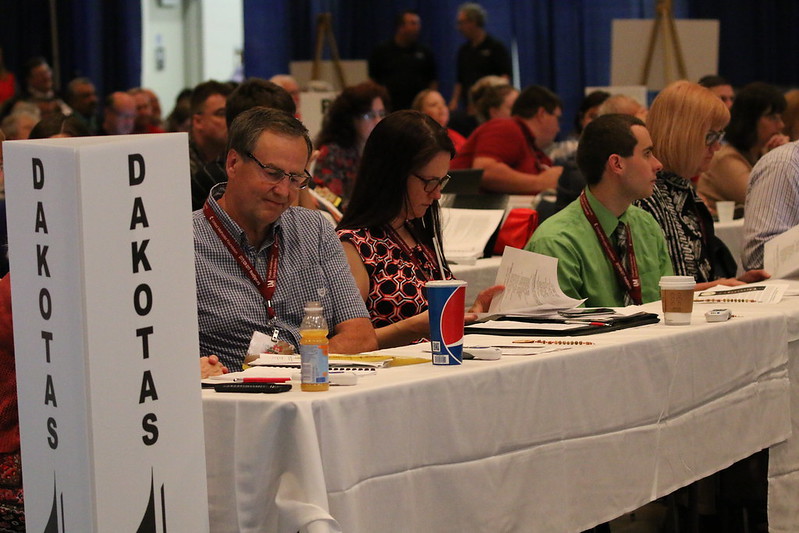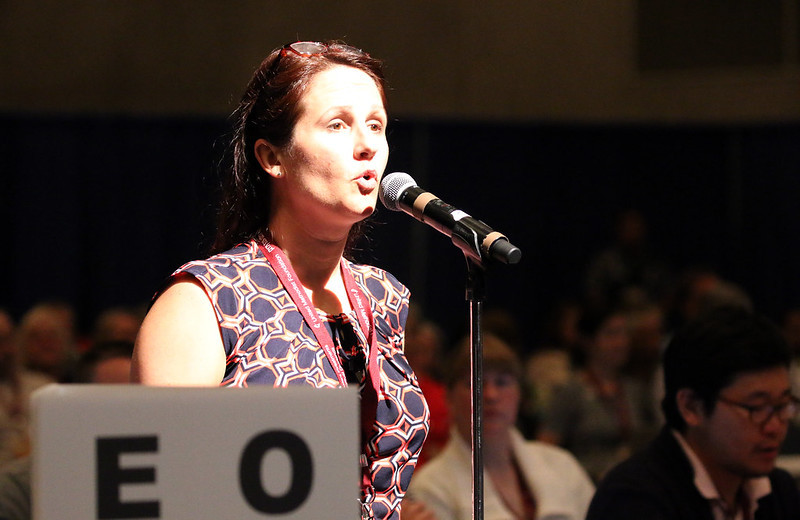
Dakotas-Minnesota Area will welcome a new bishop

Dakotas delegates Rev. Roger Spahr, left, Rev. Rebecca Trefz, center, and Matt Bader, right, during the 2016 North Central Jurisdictional Conference in Peoria, Illinois. Photo by Dave Stucke, Dakotas UMC.
The Dakotas-Minnesota Area will receive a new bishop on September 1, 2020. Bishop Bruce R. Ough, who currently serves the Dakotas-Minnesota Area, will retire.
Since early times, certain ordained persons have been selected and entrusted for a ministry of servant leadership. In the United Methodist tradition, bishops are ordained elders who are elected and consecrated to the office of bishop. They are “set apart for a ministry of servant leadership, general oversight, and supervision.”
Bishops are elected by the lay and clergy delegates in each regional area (jurisdictional and central conferences) every four years following regular sessions of the General Conference. Delegates to the North Central Jurisdictional Conference, to be held July 15-18, 2020 in Fort Wayne, Indiana, will elect one bishop.
The Dakotas Conference delegation to the North Central Jurisdiction will be:
- Clergy—Rev. Rebecca Trefz, delegate; Rev. Sara Nelson, delegate: Rev. Ray Baker, first reserve delegate, Rev. Roger Spahr, second reserve delegate; Rev. Jenny Hallenbeck Orr, third reserve delegate.
- Lay—Kara Togel, delegate; Beata Ferris, delegate; Jane Hincks, first reserve delegate; Jodi Cataldo, second reserve delegate; Tanner Carlson, third reserve delegate.
Any active ordained elder in good standing is eligible to be elected a bishop. An episcopal candidate must have at least four years of eligibility to serve before reaching the mandatory retirement age of 68.

Rev. Rebecca Trefz, clergy delegate and member of the Episcopacy Committee for the North Central Jurisdiction speaks during the 2016 Conference in Peoria. Photo by Dave Stucke, Dakotas Conference.
Nominations or endorsements of individuals by annual conferences, delegations, or other groups are common but not necessary for election. Annual conferences set the percentage of votes necessary to elect a bishop. The church recommends that a candidate receive at least 60 percent of the votes to be elected. Votes are taken in consecutive ballots until the threshold for election is reached, and a candidate is elected. The process continues until the total number of bishops needed are elected.
Currently, there are five episcopal candidates for election in the North Central Jurisdiction. Rev. Dr. Todd Douglas Anderson, a member of the West Ohio Conference, announced his candidacy for the episcopacy. Rev. Kennetha Bigham-Tsai is a nominee endorsed by the Michigan Conference. The Illinois Great Rivers Conference is endorsing Rev. Curtis Brown. The Indiana Conference endorses Rev. Aleze M. Fulbright. The Wisconsin delegation has endorsed Rev. Dan Schwerin.
In the U.S., bishops are elected for life. In some central conference areas, bishops are elected for a specified term and, if elected for a second term or serving at retirement, may become a bishop for life.
Each bishop is assigned to a particular area for a four-year term. New bishops usually are not initially assigned to areas where they served as pastors.
U.S. bishops begin their assignments on September 1. Starting dates vary for central conference bishops, depending on when they are elected.
Learn more:
- Bishops’ Ordination Chain lists all bishops and their date of election since the beginning of American Methodism.
- Listen to Bishops’ personal faith stories.
- Learn about the Council of Bishops.